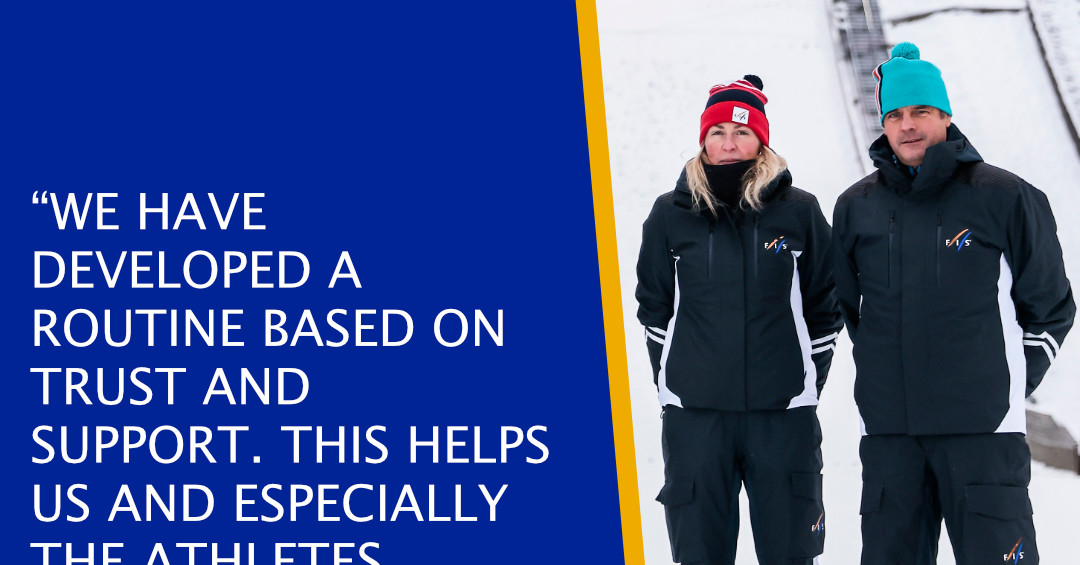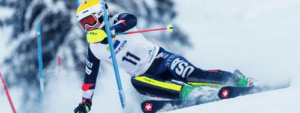“We have developed a routine based on trust and support”

[ad_1]
With the start of the FIS Nordic Combined World Cup season 2023-24, not only the athletes but also the FIS staff can expect new challenges.
In today’s Tuesday Talk, our Equipment Controllers Kerstin Löscher and Guntram Kraus told us what rule changes have been made, how big the impact of the fluor ban is on the controllers’ day-to-day work and how it is possible to inspect all athletes on a World Cup weekend with just two people.
What are the biggest equipment changes for the teams in the new season?
Guntram Kraus: In the upcoming season the biggest change is in the shoe area.
We have minimized the height of the shoe sole and at the same time reduced the overall standing height on the ski. The wedges have also been revised again, so they are again 2.5 cm narrower in thickness.
With the change we expect safer landings even in heavy snowfall and dull conditions.
The 3D measurement of the athletes is also in discussion. We will test it in Villach and then make a decision whether we will use it in the winter.
You have created a setup that allows the two of you to cover all controls during the competitions. What is the distribution of tasks and why is this continuity in the course of the season so important?
Kerstin Löscher: The tasks are basically distributed in such a way that Guntram checks the men after their jump and I carry out the appropriate checks for the women after their jump. The other one is up on the tower for the crotch measurement. Through this, we have developed a routine based on trust and support, especially during the controls. This helps both of us at work and, of course, the athletes. The feedback from the teams after last season was mostly positive with the desire to keep the setup in the future.
Due to the continuity, it is possible for us to make changes (e.g. due to weather, long distances, short periods of time, etc.) at short notice.
The fluor ban is probably one of the biggest challenges for you as EQC in the coming season. How do these additional controls change your everyday work?
Guntram Kraus: Thanks for this question! All I can say is that we carried out a lot of tests last winter and a few weeks ago and created a good plan and setup with our chief waxers from the individual nations.
Our days are definitely getting longer, Kerstin and I believe that we are well prepared and of course we hope for the support of our entire team. It’s important for us to find the right balance to stay focused because flour isn’t the only thing we control.
Are there differences in the behavior of men and women during the controls? If yes, which?
Kerstin Löscher: No, in my opinion there are no differences between the genders. Rather, it depends on the person, but that can also be handled quite well.
How has the disqualification rate changed in recent seasons and what do you think is the reason for this change?
Guntram Kraus: Last season we were able to reduce the DSQ by almost 35% and that’s certainly a big sign. We offer the teams the so-called PRE tests, meaning everyone can visit us before the competition and present their equipment and receive information. Of course, this is not a free ticket for the competition.
This system has been very well received by our teams and we will continue to work in this direction.
You supported your Ski Jumping colleagues in all their competitions at the FIS Nordic World Ski Championships in Planica (SLO). Are such cooperations planned more frequently in the future?
Kerstin Löscher: We helped out Ski Jumping as the schedule allowed. In retrospect, however, I have to say that these two weeks were very work-intensive and it was sometimes not possible for us to accompany our own competitions to the end. In the interests of our sport and athletes, an alternative solution should be sought for the next World Championships in Trondheim.
Last question: What do you enjoy most about working as EQC?
Guntram Kraus: Dealing with people and also mutual respect for one another. True to the motto the athletes are in the foreground.
Kerstin Löscher: Being able to accompany and directly follow the work and communication with the women and definitely the development of each individual athlete. Especially in challenging situations (NPS, DSQ) to support them as part of my function.
[ad_2]
Source link




